Red yeast rice is a supplement that is used to lower cholesterol and improve heart health.
It’s derived from traditional Chinese herbal medicine practices: freshly harvested rice is left to soak in water, and is inoculated with a specific kind of yeast that turns the surface of the rice a deep red and produces a number of biologically active compounds.
These compounds appear to manipulate the same biological pathways as statins, which are prescription medications that lower cholesterol.
Red yeast rice can be remarkably effective at improving heart health, but there are a lot of concerns about quality control during the manufacturing process.
If you want a high-quality red yeast rice product that’s both pure and effective, our researchers have investigated the top brands and ranked the best red yeast supplements for improving heart health.
Research
Rankings
1. Arazo Nutrition Red Yeast Rice
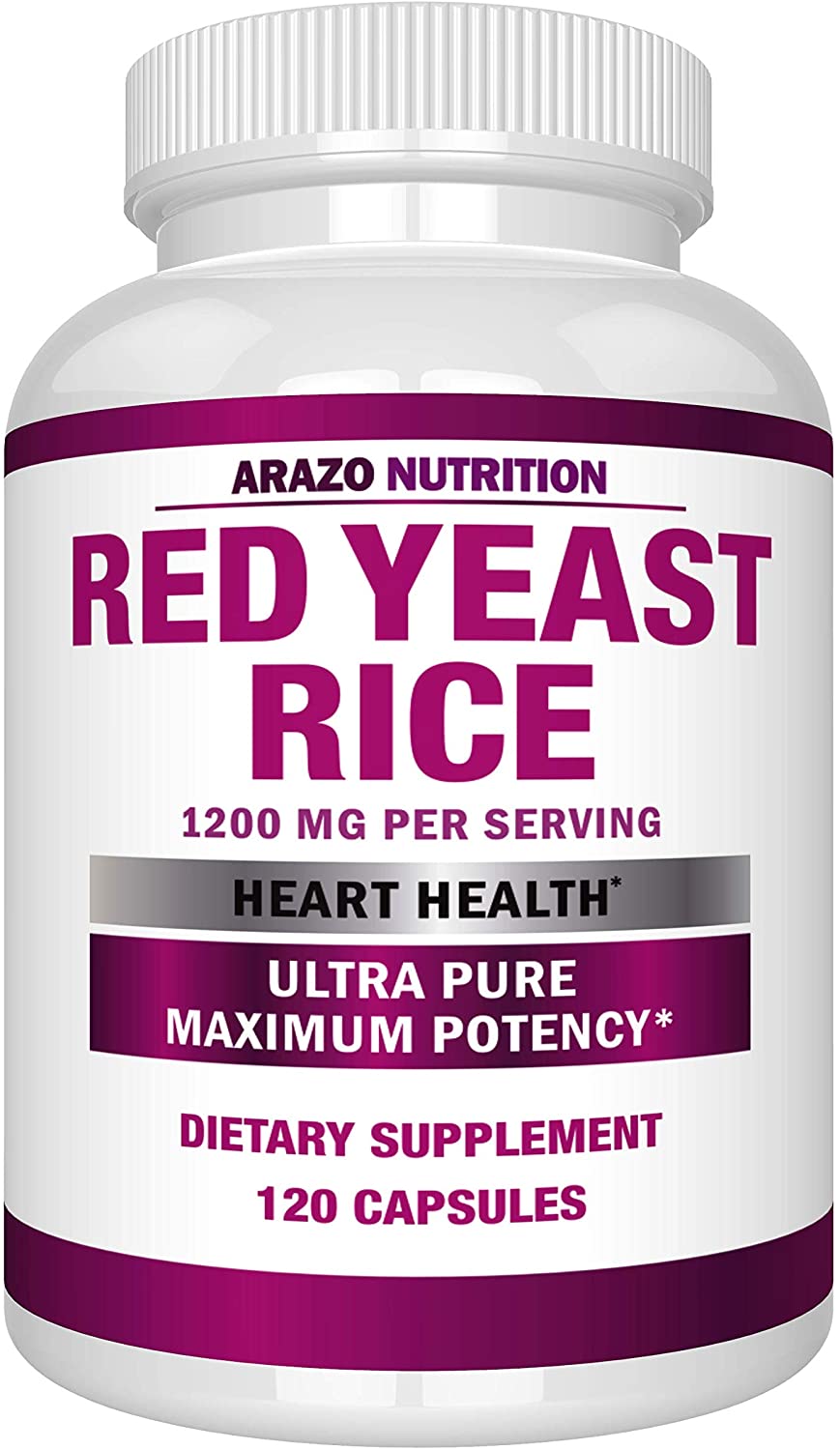
Arazo Nutrition Red Yeast Rice is an excellent option when it comes to both purity and potency.
Tested with strict standards for the presence of toxins, you can be assured that this red yeast rice supplement is both safe and effective.
It’s got 600 mg of red yeast rice per capsule, making it very easy to follow the usual clinical trial protocols for heart health. In terms of all-around utility for heart health, it’s our top pick.
2. Solaray Red Yeast Rice
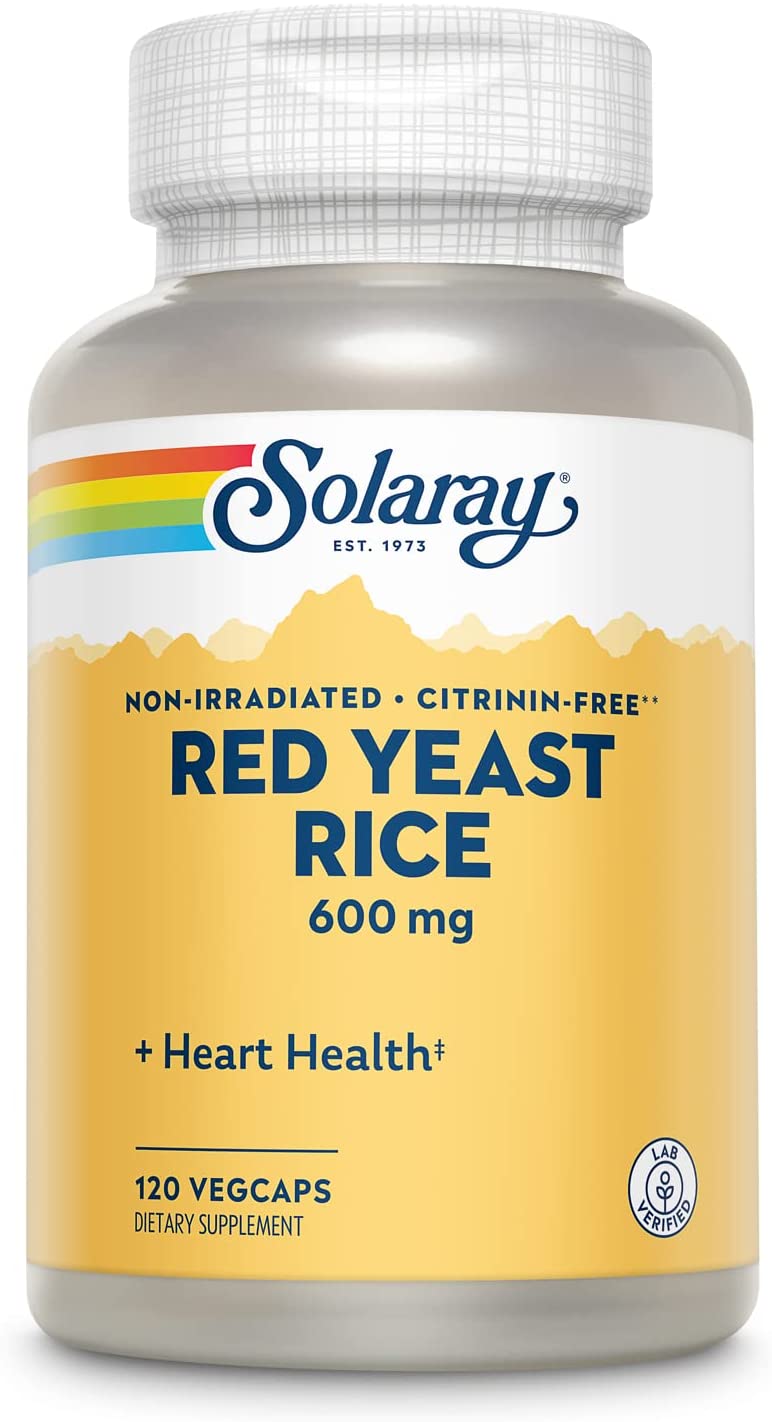
Solaray Red Yeast Rice Provides the standard 600 mg dosage used often in clinical trials, and it’s one of the few red yeast rice supplements that’s been independently tested for purity and strength. It also comes in a variant with the powerful antioxidant CoQ10.
A study published in the Journal of the American Medical Association Internal Medicine included this supplement in a paper assessing the quality of red yeast rice supplements and noted that it had zero micrograms of the kidney toxin citrinin, while other red yeast rice supplements had up to 228 mcg per dose.
The purity guarantee, combined with a fairly low monacolin K content, make this a good choice for those who are safety conscious.
3. Solgar Red Yeast Rice
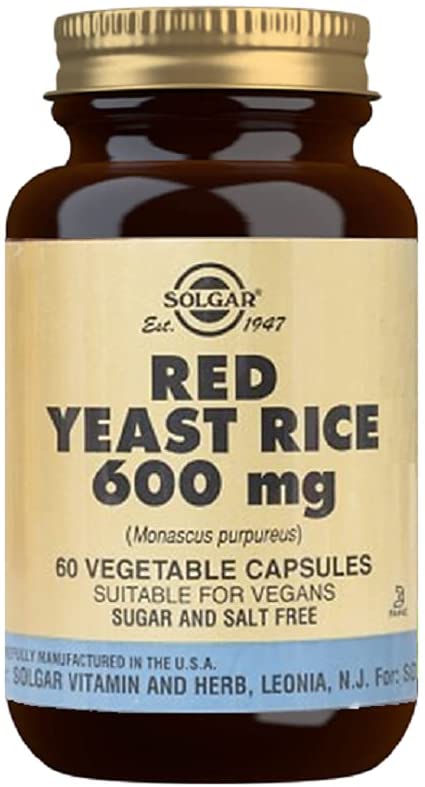
Solgar doesn’t get very fancy with their supplements, but with a red yeast rice product, that’s precisely what you are looking for.
It’s tested and certified free of the kidney toxin citrinin, and while there are a few extra binders and fillers, the real priority with a supplement like this is purity, not minimalist supplement design. It’s a very solid choice for a no-nonsense red yeast rice supplement.
4. Bluebonnet Red Yeast Rice
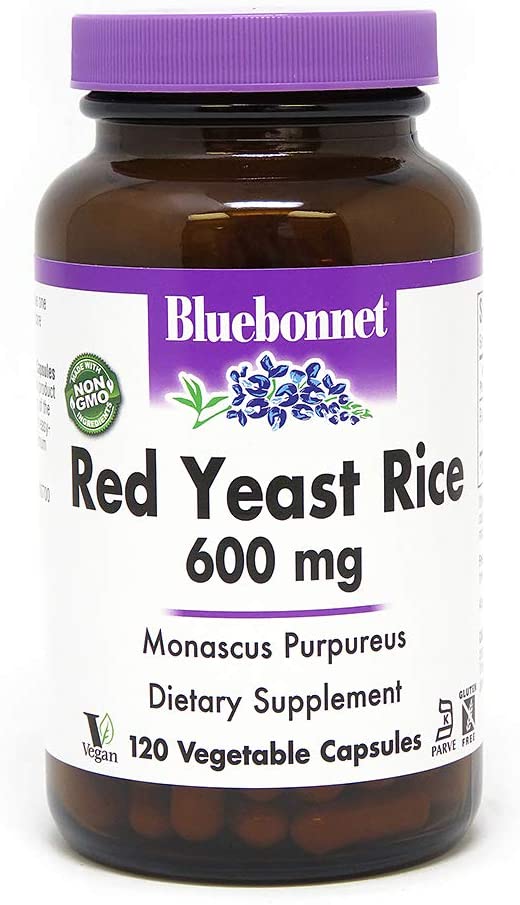
Bluebonnet is a reliable brand when it comes to pure ingredients and high quality supplements.
Their red yeast rice supplement is popular for this exact reason, though their product is also tested in-house and not by a third-party independent lab.
5. aSquared Nutrition Red Yeast Rice
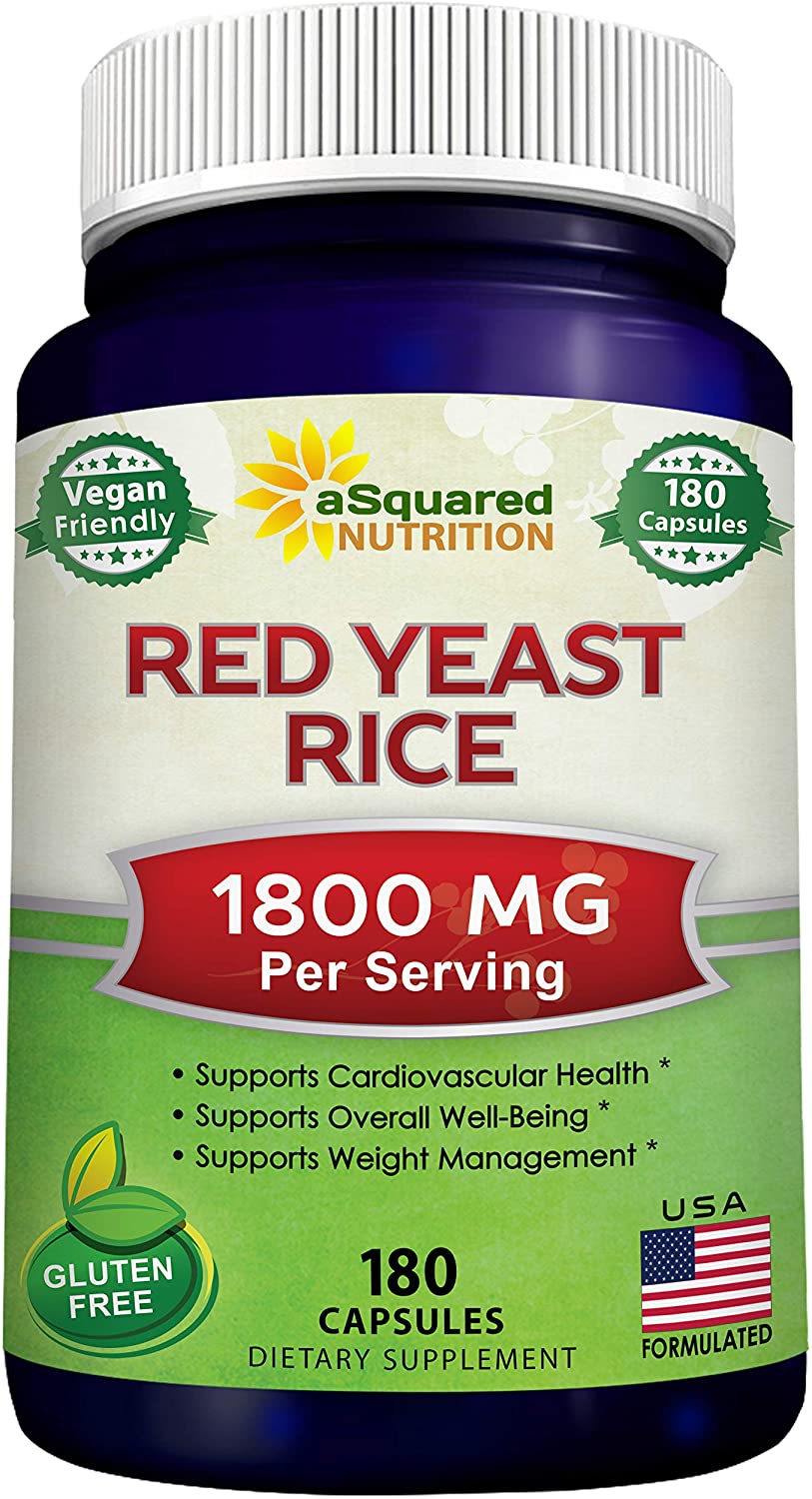
aSquared Nutrition Red Yeast Rice advertises itself as high-dose, but it contains the same 600 mg dosage of red yeast rice you’ll find in just about any similar product.
Where this red yeast rice supplement shines is in its clean supplement design: with only red yeast rice, rice flour, and gelatin, its ingredients list is incredibly simple, making it a good choice for the purists out there.
6. Sundown Naturals Red Yeast Rice
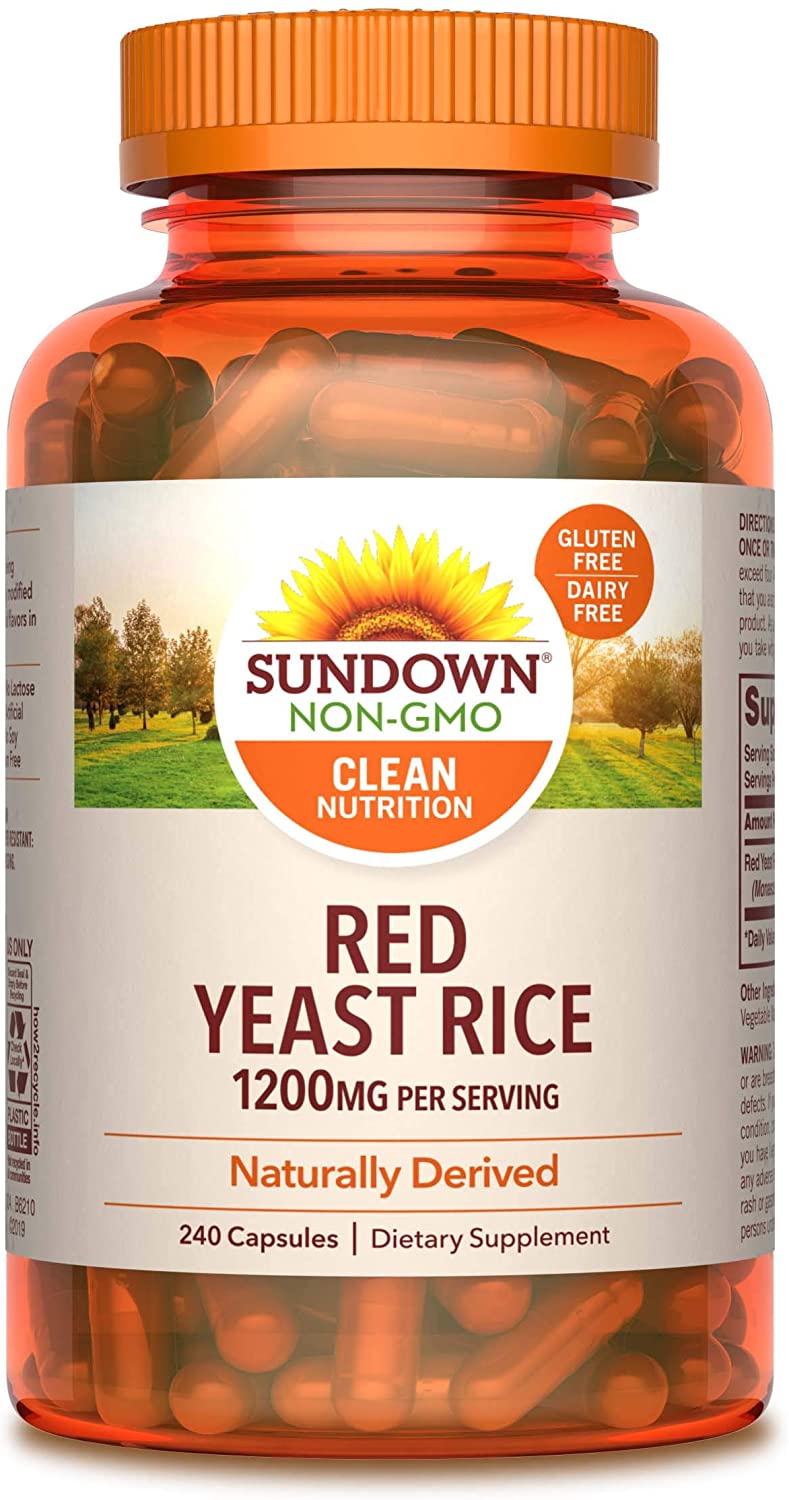
Sundown Naturals makes a red yeast rice supplement that’s tested (albeit in-house, not by an independent lab) for purity and potency, and delivers the usual dosage.
With 240 capsules per bottle, it’ll last quite a while, making this a solid choice for long term use.
7. Micro Ingredients Red Yeast Rice Powder
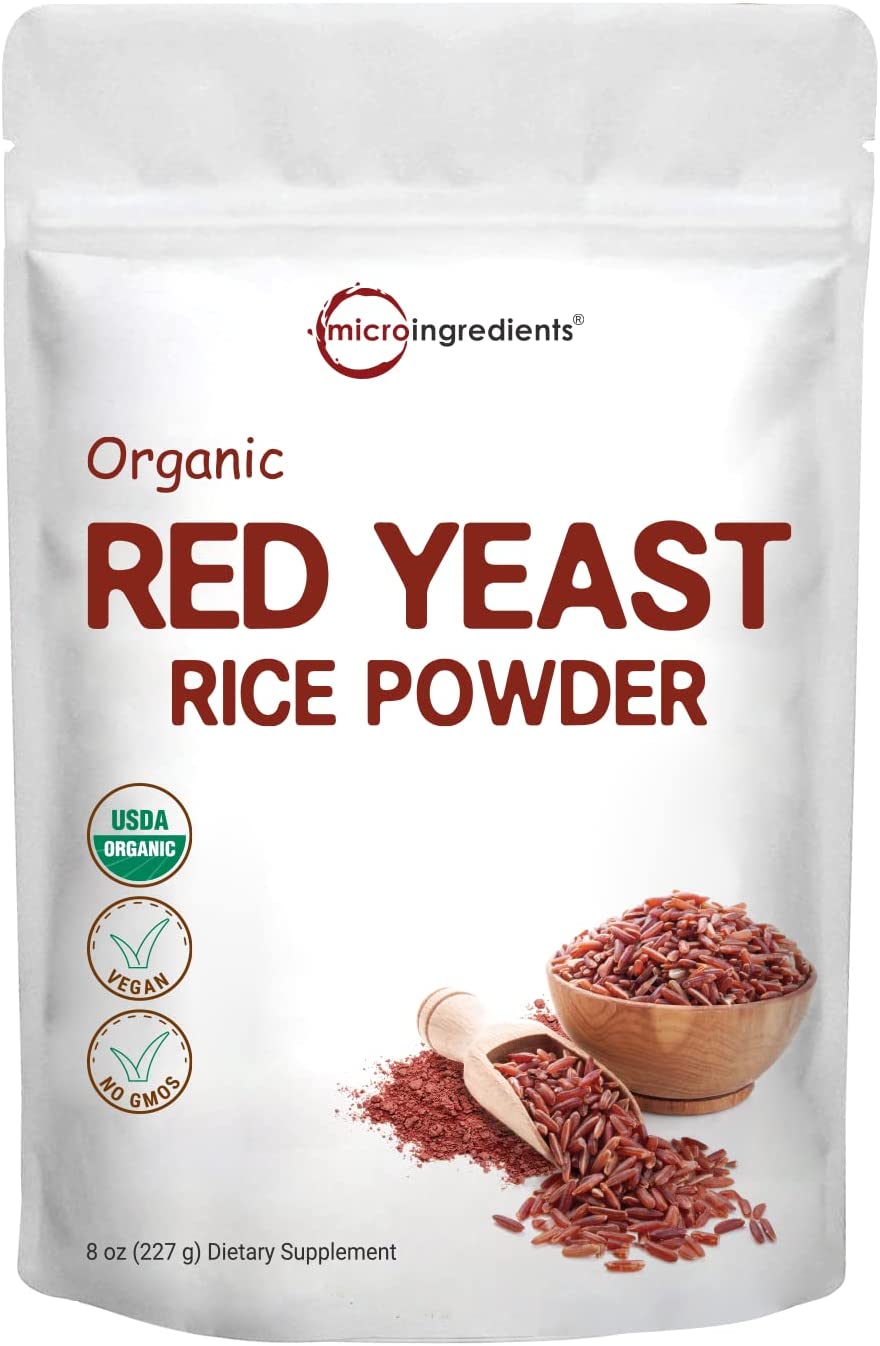
While most people are best-served by capsule-form red yeast rice, there are some niche use cases where powder-form red yeast rice makes sense. For people who want to incorporate red yeast rice into supplement blends, or make their own smoothies, shakes, or recipes, Micro Ingredients is a great choice thanks to its organic certification and pure formulation. Just make sure you’ve got the equipment to accurately measure dosages of raw powder.
8. Pure Naturals Red Yeast Rice Pure
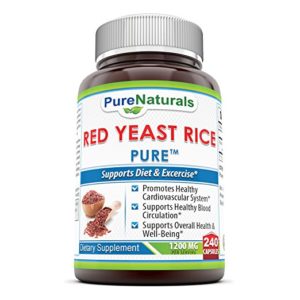
Pure Naturals Red Yeast Rice Pure has the expected 600 mg dosage of red yeast rice, and a gelatin capsule with a few more binders and fillers than you’d find in some of the top ranked supplements.
While pure is in the brand name, the company doesn’t specifically mention any independent third-party testing for purity.
9. Amazing Nutrition Red Yeast Rice
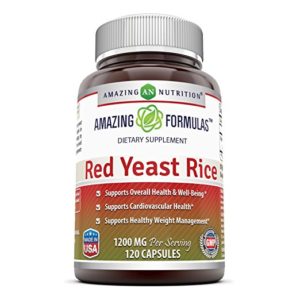
Amazing Nutrition has a solid red yeast rice supplement that’s got the usual 600 mg dosage of red yeast rice, though its gelatin capsule has a few too many binders and additives for the purists out there.
10. Puritan’s Pride Red Yeast Rice
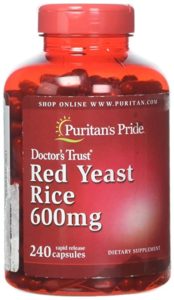
Puritan’s Pride Red Yeast Rice has the usual 600 mg dosage of red yeast rice, but there’s no mention of independent lab testing or a certification that this supplement is citrinin-free. While it’s popular, other supplements beat it out when it comes to purity and quality.
Category winners
Best red yeast rice overall: Arazo Nutrition Red Yeast Rice
Arazo Nutrition takes our top spot thanks to its solid dosage, simple ingredient list, and stringent purity requirements. It delivers 600 mg of red yeast rice powder per capsule, and each batch is screened for purity to ensure there are no mycotoxins present.
Best red yeast rice for blood sugar: Solaray Red Yeast Rice / CoQ10
Blood sugar control is a significant contributor to heart health, and inflammation is one factor that’s caught up in both metabolic and heart health. To that end, we like the red yeast rice / CoQ10 combination from Solaray for targeting blood sugar control, which augments the benefits of red yeast rice with the antioxidant power of CoQ10.
Best red yeast rice for cooking: Micro Ingredients Red Yeast Rice Powder
Looking to incorporate red yeast rice into shakes, smoothies, or cooking recipes? Micro Ingredients is the way to go. It’s organically certified and contains only 100% pure red yeast rice powder.
Best red yeast rice for cholesterol: Arazo Nutrition Red Yeast Rice
Since promoting cholesterol health is one of the main uses of red yeast rice, it should come as no surprise that our top pick overall is also our top pick for cholesterol control. Arazo Nutrition delivers an effective dosage in a pure formulation with no extraneous ingredients, making it a great choice.
Best red yeast rice with CoQ10: Solaray Red Yeast Rice / CoQ10
CoQ10 is one of the most popular companion supplements to red yeast rice, since the powerful antioxidant capabilities of CoQ10 may address inflammation, one of the other major contributors to heart health. For a two-in-one punch, we like Solaray because of its solid dosage and clean ingredient design.
Best red yeast rice powder: Micro Ingredients Red Yeast Rice Powder
Red yeast rice is usually easier to take in capsule form, but for people looking to mix up their own supplement blends, or incorporate red yeast rice into cooking or baking recipes, Micro Ingredients makes a great powder-based red yeast rice that’s pure, organic, and easy to use.
Who should buy red yeast rice?
Red yeast rice is great for individuals looking to improve their cholesterol profile by lowering bad LDL cholesterol. However, it can interact with a variety of medications, so it’s best to consult a doctor before taking it.
Red yeast rice is not appropriate for pregnant women and children due to the lack of studies surrounding these populations. People with kidney or liver disease should also avoid red yeast supplements as they may negatively affect these people.
If you have high blood pressure or are taking thyroid medication, you should avoid red yeast rice as it may alter the effects in the body. While red yeast rice is promising for a lot of treatments, it certainly needs more research to prove its efficacy.
How we ranked
One of the most important factors to look for, when choosing the best red yeast rice supplements, is the level of kidney toxin citrinin. Most products have it filtered out, but to be on the safe side, we looked for products that specifically mentioned this on their website. Furthermore, companies like Solray and Solgar, who have shown proven testing that they have eliminated it from their formula, ranked higher.
Next, we looked at purity. For the most part, you’ll find simple and pure red yeast supplements on our list without additional ingredients. One of the reasons for this is because a significant dose is required to hit the daily dosage, and adding anything else would make the capsules quite large. The other reason a minimal ingredient list was important to us was that red yeast rice tends to interact with many medications and supplements, and adding an additional ingredient further complicates things.
In terms of the capsule, we preferred something with minimal binders and fillers. Furthermore, products that were made with a gelatine capsule were ranked lower than those with cellulose-based capsules (summing all other factors were identical).
Lastly, we looked at the dosage. According to research and various clinical trials, the standard treatment for cholesterol is between 1200mg and 2400mg, broken up into 600mg doses. To make things simple, we preferred products like Arazo that came with the standard 600mg dosage. Anything less was either axed or penalized in our rankings.
Benefits
Red yeast rice has been shown to lower cholesterol levels in clinical studies. The heart health benefits of red yeast rice go beyond just theoretical and anecdotal evidence: it’s been tested directly in placebo-controlled trials.
One such study was published in the American Journal of Clinical Nutrition by researchers at the UCLA School of Medicine (1).
This experiment involved over 80 subjects with high cholesterol, who were divided up into two groups. One group received 2400 mg of red yeast rice per day, while the other group received a placebo. Both groups were given dietary advice for lowering cholesterol levels.
After 12 weeks of follow-up, the researchers found that the red yeast rice group experienced a significant decrease in LDL cholesterol and total cholesterol levels compared to the placebo group, but did not experience any decrease in HDL (“good”) cholesterol levels.
Other clinical trials have confirmed the effects of red yeast rice on LDL cholesterol; a systematic review published in 2014 found that there is a consistent benefit to taking red yeast rice when it comes to lowering LDL cholesterol levels and improving heart health (2).
Red yeast rice exploits the same mechanism to lower cholesterol as statins. The active ingredient in red yeast rice is a category of compounds called monacolins, and one of these—monacolin K—is chemically identical to lovastatin, which is the active ingredient in statin drugs for lowering LDL cholesterol.
However, the cholesterol lowering ability of red yeast rice seems to be due to more than just its monacolin K content, because it appears to be effective even at lower equivalent doses compared to statins, if you only consider its monacolin K content.
One meta-analysis of several clinical trials on red yeast rice for lowering cholesterol noted that the typical amount of monacolin K contained in red yeast rice supplements is lower than the equivalent amount of lovastatin which would create a similar decrease in LDL cholesterol (3).
You won’t find red yeast rice supplements that advertise their monacolin K content. One outcome of the research into red yeast rice was a series of court battles in the late 1990s over whether red yeast rice should be considered a supplement or a drug.
Initially, red yeast rice products were pulled from the market, because they made specific claims about cholesterol and listed their monacolin K (lovastatin) content (4).
When red yeast rice was reintroduced, all claims regarding monacolins had disappeared, which puts consumers in limbo—many red yeast rice supplements still have monacolin K in them, but levels from supplement to supplement vary widely.
One study published in 2010 in the Journal of the American Medical Association Internal Medicine looked at the content of several leading red yeast rice supplements and found that the monacolin K levels per 600mg serving ranged from 0.2 to 20.8 mg, a 100-fold difference in dosage (5).
Side effects
While the rate of side effects in studies on red yeast rice is low, there is still some concern about similar side effects to those encountered with statins.
One review noted no serious side effects across 13 trials which included over 800 participants (6), and another trial of almost 5,000 people in China reported no difference in the incidence of side effects between the red yeast rice group and a placebo group (7).
However, some evidence from European countries indicates that there may the possibility for red yeast rice to cause muscle damage and liver injury (8).
These incidents happened outside of clinical trials, so it’s harder to establish causality, but these side effects mirror those of statins.
Beyond the effects of the active ingredients, scientists have raised the alarm about contamination by a compound called citrinin, a naturally occurring toxin that can cause kidney damage.
One study published in 2010 noted that four out of twelve red yeast rice supplements that the researchers tested contained some amount of citrinin (9).
The best red yeast rice supplement brands will test their product for citrinin, or even better, hire an independent third party laboratory to conduct citrinin testing.
Since red yeast rice can contain the same active ingredients as statins, all of the same possible medication interactions apply.
People who take statins or other prescription medications already should definitely talk to their doctor first before taking a red yeast rice supplement.
Recommended dose
Most clinical trials use a daily dosage of 1200 to 2400 mg of red yeast rice per day. This is easy to achieve with two to four 600 mg capsules taken throughout the day.
The real challenge is that the level of monacolins can vary substantially from one supplement to another, and unfortunately, there’s no good way to asses monacolin levels aside from trial and error. The best you can do is stick to recommended dosages from a high-quality manufacturer.
FAQ
What is the main purpose of red yeast rice? Red yeast rice is a supplement with a very focused purpose—it is used to improve heart health, particularly by lowering your LDL (“bad”) cholesterol levels in a manner similar to that of statins, which are prescription cholesterol lowering drugs (this category includes medications like Lipitor and Zocor).
It’s been used in China for cooking and for traditional herbal medicine for thousands of years, but the potential health benefits of the active ingredients in red yeast rice weren’t recognized until a few decades ago. Today, it’s a popular but contentious supplement, specifically because it is so effective when it comes to lowering cholesterol.
When should I take red yeast rice? It’s typical of other statin drugs to be taken before bedtime, so many users of red yeast rice do the same. There have been rare cases of it causing insomnia in some individuals, but that is not the typical occurrence.
How do I know if red yeast rice is right for me? If you are looking to lower your cholesterol and are not currently on any medications, red yeast rice may be an excellent solution for you. If you have a perfectly healthy liver, no muscle issues, and are not pregnant or breastfeeding, you could benefit from red yeast rice. Please consult your doctor or pharmacist before introducing a new supplement to your routine.
How long should I take red yeast rice? Research shows that individuals can take a red yeast rice supplement consistently for up to six months to see lower cholesterol results. Studies have shown that you can see lower cholesterol in as little as eight weeks. One specific trial showed that participants who took 2.4 grams of red yeast rice reduced their LDL by 22% and total cholesterol by 16% in 12 weeks, and another showed that 1.2 grams per day lowered participants’ LDL cholesterol by 26% in only eight weeks.
A significant factor in the success of these studies is contributed to the amount of naturally derived statin in the product. The statin content can vary widely from product to product, but most of them do contain statins even if it’s not on the label. Red yeast rice works fairly quickly in reducing cholesterol, so being closely monitored by your doctor is crucial.
Should I take red yeast rice if I take other medications? Red yeast rice has several medications that it has reportedly interacted poorly with. It is crucial to consult your doctor before taking red yeast rice, to be on the safe side.
Medications like Cyclosporine, Gemfibrozil, and Hepatotoxic drugs combined with a red yeast rice supplement can do damage to the liver and muscles and should not be taken together. Medicines that are processed by the liver should not be combined with red yeast rice. Combining the two can exacerbate the adverse effects of the supplement on the liver.
Statins should not be taken at the same time as red yeast rice because they have similar jobs. Combining the two can lead to adverse effects. Speak to your doctor before taking supplements if you are regularly taking any of the medications listed.
Should I take red yeast rice if I am taking other supplements? Red yeast rice is typically combined with other supplements in one pill, like Omega-3’s, CoQ10, and nattokinase. The fact that it’s usually sold in this manner does not mean it’s suitable to be combined with other supplements. Taking St. John’s Wort can increase the likelihood of adverse side effects and reduce the effectiveness of the supplement. Also, drinking grapefruit juice can interact negatively with the supplement. There are no other significant interactions noted, but contact your doctor before taking several different supplements.
What are the best brands of red yeast rice? When choosing a new supplement to introduce into your diet, you want to make sure you’re taking a high-quality product. Choosing a reputable brand with an excellent reputation is one way to decide which one is right for you. You can also ask your doctor or pharmacist for their recommendation.
Some of the top-selling red yeast rice supplements are Puritan’s Pride Q-Sorb CoQ10 Plus Red Yeast Rice, Azaro Nutrition Red Yeast Rice Extract, Pure Naturals Red Yeast Rice Dietary Supplement, Solaray Red Yeast Rice Plus CoQ-10 with Niacin, and Puritans Pride Red Yeast Rice.
Is red yeast rice the same as a statin? Red yeast rice contains trace amounts of Monacolin K, which is a chemical that identically matches the active ingredient in Lovastatin, a cholesterol-lowering medicine. It works to reduce your bad cholesterol and lower the overall cholesterol in your body. Studies have shown that each red yeast rice supplement’s individual Monacolin K content varies widely. The highest amount that has been seen in a capsule is up to 10.9 mg, whereas Lovastatin has 20mg.
The FDA has not approved red yeast rice as a proper replacement for a statin drug. Some varieties of them have even shown to have trace amounts of the potentially toxic compound citrinin, which causes kidney damage. The combination of citrinin and red yeast rice can impact the kidney’s function. Supplements that are not approved by the FDA are not subject to the high standards and regulations the FDA uses, and they don’t need to prove effectiveness.
There is no significant benefit reported through clinical trials that a red yeast rice supplement would be better than a statin. Products vary so widely, it’s not guaranteed your dosage would be enough, or that it would be a pure product. Finding a prescribed statin medication for lowering your blood pressure can be appropriately done with the help of your physician.
Can I use red yeast rice instead of my prescribed medication to lower my cholesterol? You should never stop taking a prescribed medication without the supervision of your doctor to replace it with something else. Consult your doctor if you want to switch your medications. While the active ingredient in red yeast rice is the same as a statin, the dosage and quality vary widely, and they are not FDA approved. They should not be considered a substitute for a prescribed statin.
Which red yeast rice products contain Lovastatin? While red yeast rice is being fermented, the process naturally produces a small amount of Lovastatin. In a 2012 study by the Journal of Evidence-Based Integrative Medicine, 117 commercially sold red yeast rice supplements were evaluated to check the Lovastatin content. 14% of the products had information on the label regarding the Lovastatin content, and over 80% had no information on the label.
The manufacturers were also unwilling to provide additional information, so the researchers could not provide more details. While many consumers take a red yeast rice supplement to replace the need for a statin in reducing their cholesterol, most of them do not know that many products have the drugs in them, and it’s not documented (10).
Can I cook with red yeast rice? Yes, you can cook with red yeast rice. It won’t be the same as the supplement, but there are still benefits to your health by consuming it. You can cook it just as you would regular rice, but it is a big part of Asian dishes.
What will happen if I am allergic to red yeast rice? If you are experiencing an allergic reaction to a red yeast rice supplement, it could either be from the rice or the mold used during the fermentation process. If you are allergic to the supplement, you may get hives, a rash, and have difficulty breathing. You may experience swelling in your face, nose, throat, lips, and tongue.
Get emergency medical help if these symptoms are severe or persist. If you feel muscle pain or tenderness, weakness, fever, fatigue with difficulty urinating or having dark-colored urine, seek medical attention and stop taking the supplement immediately.
Can I use red yeast rice supplements if I am pregnant or breastfeeding? You should avoid taking red yeast rice supplements during pregnancy or while breastfeeding. Research is limited on the long-term effects of red yeast rice, so it is not recommended.
Can I use red yeast rice if I have liver issues? Red yeast rice supplements can cause liver damage, so if you have preexisting liver conditions, you should avoid red yeast rice. Consult your doctor if you want to introduce a new supplement to your routine.
Will red yeast rice help me lose weight? In a 2015 study, along with studying the effects of red yeast rice lowering cholesterol, the goal was to see what benefits the supplement had on obesity.
In mice, there was a positive effect from the red yeast rice supplement in preventing further weight gain while on a high-fat diet. This is yet to be confirmed in human clinical trials, so consult your physician before taking a red yeast rice supplement for weight loss (11)
Are supplements without Monacolin K better than supplements with it? The Monacolin K compound is the specific active ingredient in statins. Some supplements have the information regarding the contents of this ingredient on the label, and some don’t.
If you are looking to use the product for lowering cholesterol, a product with Monacolin K is better suited for you. Please consult with a doctor before taking a supplement in place of prescribed medication to treat your medical conditions.
Can I drink alcohol while taking red yeast rice? No, you should not be drinking alcohol and taking a red yeast rice supplement at the same time. Both products negatively affect the liver, which increases your risk of damage. Protect your liver and don’t consume alcohol while taking this supplement.
Related articles
Recap
Red yeast rice is a reliable way to lower LDL cholesterol, and at least in part, this appears to be due to the effects of the biologically active compound monacolin K.
It’s been demonstrated as an effective method to improve heart health in a number of clinical studies, though given the current regulatory environment, it’s difficult to figure out which brands have the most effective dosage.
The primary thing to watch out for is purity testing—less reputable brands have been known to be contaminated by the kidney-damaging toxin citrinin, so make sure you get a top-ranked red yeast rice supplement for optimal purity and safety.
Red yeast rice can have some of the same side effects as statins, though the risk is low: these can include muscle damage and liver injury, though none of these effects have occurred in clinical studies.
People who are taking prescription medication should talk to their doctor before taking red yeast rice, since it could cause some adverse effects by interacting with drugs that you are taking.
With the above caveats, the scientific research says that red yeast rice is a powerful and effective way to improve your heart health by lowering your cholesterol levels.
It might be worth considering if high cholesterol is a problem that you know that you face.
For BodyNutrition’s #1 recommended red yeast rice supplement, click here.